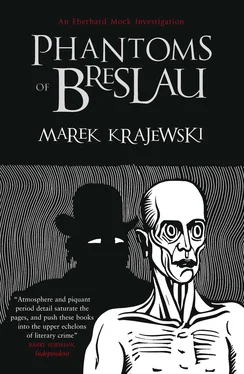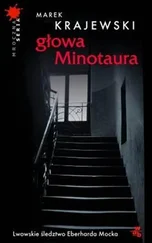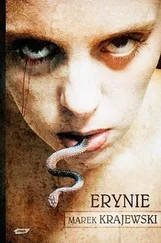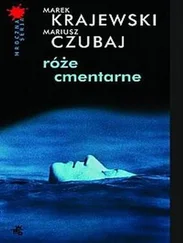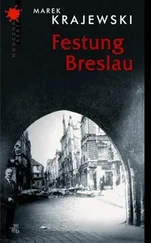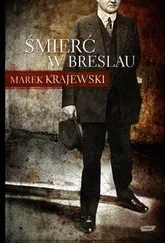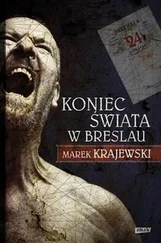Marek Krajewski - Phantoms of Breslau
Здесь есть возможность читать онлайн «Marek Krajewski - Phantoms of Breslau» весь текст электронной книги совершенно бесплатно (целиком полную версию без сокращений). В некоторых случаях можно слушать аудио, скачать через торрент в формате fb2 и присутствует краткое содержание. Жанр: Полицейский детектив, на английском языке. Описание произведения, (предисловие) а так же отзывы посетителей доступны на портале библиотеки ЛибКат.
- Название:Phantoms of Breslau
- Автор:
- Жанр:
- Год:неизвестен
- ISBN:нет данных
- Рейтинг книги:3 / 5. Голосов: 1
-
Избранное:Добавить в избранное
- Отзывы:
-
Ваша оценка:
- 60
- 1
- 2
- 3
- 4
- 5
Phantoms of Breslau: краткое содержание, описание и аннотация
Предлагаем к чтению аннотацию, описание, краткое содержание или предисловие (зависит от того, что написал сам автор книги «Phantoms of Breslau»). Если вы не нашли необходимую информацию о книге — напишите в комментариях, мы постараемся отыскать её.
Phantoms of Breslau — читать онлайн бесплатно полную книгу (весь текст) целиком
Ниже представлен текст книги, разбитый по страницам. Система сохранения места последней прочитанной страницы, позволяет с удобством читать онлайн бесплатно книгу «Phantoms of Breslau», без необходимости каждый раз заново искать на чём Вы остановились. Поставьте закладку, и сможете в любой момент перейти на страницу, на которой закончили чтение.
Интервал:
Закладка:
“You crazy swine!” Mock grasped his head, unable to hide his horror. “You’ve killed your own daughter? Your own beloved daughter?”
“I haven’t killed her yet,” Ruhtgard shouted through cupped hands from the bottom of the pool: “For the time being I’ve merely imprisoned my Christel … My daughter … She proved useful in my hypnosis experiments, as best she could. And now she’s out there somewhere, together with your father … She and your old man are a guarantee of my immunity.”
“That’s why you looked so strange when I told you I’d fallen in love with Erika Kiesewalter, before the hypnosis …” Mock said quietly. “You realized you had imprisoned your own daughter unnecessarily … You could have locked Erika away, and you wouldn’t have felt her death as acutely as that of your own child …”
“Correct.” Ruhtgard grabbed hold of the pool’s edge and hauled himself up. His face found itself at a level with Mock’s. He looked the police officer deep in the eye. “But I stopped loving Christel … She betrayed me once too often. Besides, she’s no use to me any more… She won’t undergo any more hypnosis … She said it hurts afterwards… She hates me … She’ll soon leave me for some stinker …”
Mock recoiled in disgust. Ruhtgard made a rapid move, straightened his arms on the pool’s edge and managed to lean against them. One more move and his knee was over the edge too. Mock hit him in the face. There was a loud splash.
“Don’t try to get out of there,” he said calmly. “And answer my questions. Who was it, then, who wrote the murderer’s diary? And who scribbled ‘Have to run for it’ at the seance?”
“That ‘diary’, as you call it” — Ruhtgard was standing at the bottom of the pool, rubbing one cheek, red from the blow, and the injuries inflicted by Smolorz looked like boils on his white skin — “was written by me. Rossdeutscher took minutes during the rites. I was the brotherhood’s chronicler but only Rossdeutscher could take down the Master’s translations. When I heard you, I scribbled something and hid under the desk. My notes fell into your hands. You assumed Rossdeutscher had written them. You don’t know my handwriting. Our German secondary schools are fortunately very strict about Sutterline handwriting, apart from for Greek and Latin. Our writing looks much the same: yours, mine and Rossdeutscher’s. No court is going to believe a handwriting expert.”
Firm, resolute steps resounded in the subterranean corridors of the Institute of Forensic Medicine. Kurt Smolorz entered the pool room.
“There’s nobody in that cellar,” he said, out of breath. “Only a sign on the door.” He reached into his pocket and handed Mock a scrap of paper.
“‘ Gnothi seauton ,’” Mock read the Greek words. “‘Know thyself.’”
Mock looked at Ruhtgard dispassionately and instructed Smolorz:
“Turn the wheel, open the sluice! Tell me, you son of a whore, where is my father?”
Smolorz turned the wheel, and water mixed with formaldehyde spurted straight into Ruhtgard’s open mouth. The Criminal Sergeant then opened the sluice gate, resting the end of it against the pool’s edge to form a kind of platform, and moved away in revulsion. Beneath the sluice gate was a swollen, green corpse.
“Listen to me, Mock …” Ruhtgard again hauled himself up on his hands, but this time only his chin appeared above the pool’s edge. “You’ve got nothing on me. Rossdeutscher committed suicide. He was your murderer … And I’m untouchable. But that’s not all. You’re in my hands. Send your denial to the Breslauer and the Konigsberg Allgemeine Zeitung , and let me go. The worse that can happen is that you’ll lose your job in the police force. But you’ll save your own father and my daughter. What’s the girl done to you? Don’t forget the impression you made on her that night. You can have her, you can screw her as much as you like …”
Mock stepped away from the pool and reached for a thick rubber hose.
“Don’t try to climb out, or you’ll get a jet of water in your mug,” he said calmly. “What guarantee do I have that you’ll let them go? Maybe you’ll take revenge on me and kill them after all …”
“I’m not going to murder my own daughter, much as I may despise her.” Ruhtgard stared with disgust at the green corpse lodged in the sluice. “Let me go, Mock, and everything will be alright. All you’ll do is lose your job, while the denial will reap such fruit. The denial, Mock. I can make you do things — like I did during hypnosis. I’m untouchable. Even if I were to screw that whore Kiesewalter in front of your very eyes, you wouldn’t do anything to me because I’ve got you in my hands … I must have given you the wrong address for the cellar — I’ll give you the right one now …”
Mock gave Smolorz a signal. The Criminal Sergeant tugged the corpse by its hair with disgust and the greenish body slid into the water with a gentle splash. The face of the deceased was blackened by fire, his hair thick and brown. His pubic hair reached as high as his navel. Mock squirted water into Ruhtgard’s face and the doctor found himself back in the pool. The bloated body spun slowly in the stream of water and formaldehyde. Ruhtgard yelled at the top of his voice. Only his head remained above the surface.
“Where is my father?” asked Mock.
Once again, Ruhtgard clambered up the pool’s edge. He put his forearms on the tiles and rested his chin on his hands. His bloodshot eyes were fixed on Mock.
“It’s stalemate, Mock,” he said. “It only takes four days for a man to die of dehydration. Send that denial to the press.”
“Tell me one more thing,” Mock said, as if he had not heard the ultimatum. “Where did my dreams, my nightmares come from?”
“They weren’t dreams, they were the Erinyes. Real beings which exist objectively. Ghosts, phantoms, spectres if you like.” Ruhtgard’s chin was still resting on his hands, while the stout railwayman who had urinated from a viaduct onto a high-voltage cable a few days earlier turned in the eddies below.
“Then why did you try to prove to me that ghosts are only subjective?”
“I was playing devil’s advocate, to strengthen your belief … To make you confess to your mistake with utter conviction … So that you’d say: it must have been real ectoplasm after all!”
“Why did you gouge out their eyes and stick needles into their lungs?”
“Are you really so stupid, or are you just pretending?” Ruhtgard’s pupils dilated and contracted like a shutter in a camera. “Strain your drunken brain a little! ‘If your eye causes you to sin, gouge it out.’ It’s from St Matthew. †And listen to St John, that great visionary, who wrote: ‘Blessed are those who have not seen and yet have believed.’” ‡
“And the needles in their lungs?”
“I was taking away their breath, taking their spirit!”
Mock thought back to his university lectures in comparative literature and could hear Professor Rossbach’s voice: “Marcus Terentius Varro was right in saying that the Latin animus (spirit) is related to the Greek anemos (wind),” the professor had explained. “A living person breathes and from his lips, ergo , comes wind, but a corpse does not breathe. In a living person there is a spirit; a dead man has no spirit. Hence the simple — we could almost say ‘commonsensical’ — identification of spirit with breath. It is the same in the Slavic languages, where dusza (spirit) is etymologically related to zdech (died), and oddech (breath). It is the same even in the Hebrew language. There, ruach means both spirit and wind, although — and here I must castigate myself — the concept of ‘breath’ is rendered by an entirely different word, namely nefesh . So you see, gentlemen, the study of etymology is one way of learning about spiritual culture, a culture, let us add, that is common to both Indo-Germans and Semites.” Professor Rossbach’s voice fell silent in Mock’s head. In its place he heard his own father’s nagging: “Chamomile and hot milk”.
Читать дальшеИнтервал:
Закладка:
Похожие книги на «Phantoms of Breslau»
Представляем Вашему вниманию похожие книги на «Phantoms of Breslau» списком для выбора. Мы отобрали схожую по названию и смыслу литературу в надежде предоставить читателям больше вариантов отыскать новые, интересные, ещё непрочитанные произведения.
Обсуждение, отзывы о книге «Phantoms of Breslau» и просто собственные мнения читателей. Оставьте ваши комментарии, напишите, что Вы думаете о произведении, его смысле или главных героях. Укажите что конкретно понравилось, а что нет, и почему Вы так считаете.
